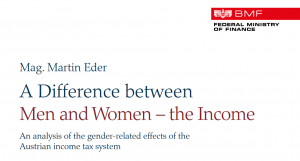
In Austria, differences in primary incomes prevail. While full gender equality would require changes in the distribution of primary incomes, it might be worthwhile taking a look at gender-related effects of taxes and tax reforms. A study scrutinising the Austrian tax system highlights that not only female wage earners as well as self-employed ones receive only about two third of the average wages of male counterparts, but also that their income-related taxes do not ease this problem as redistributive effects vary widely: By way of example, social security contributions are mainly regressive so that they may actually increase income discrepancies. As income taxes are progressive, the overall effect would be slightly positive if it was not for tax reliefs that come with the 13th and the 14th monthly salaries or the tax-fee profit margin for self-employed people, which, once again, diminish any positive redistributive effects.
Austria’s most recent tax reform has entailed some redistributive effects such as a reduction of the tax rate for the lowest bracket to 25 % and an overall lower tax rates for lower incomes, as well as an increase of the tax-free amount for children and a “splitting advantage”; nevertheless, it still mostly serves men. Find out why and access the full paper here.
Leave a reply by using the form below. If you cannot access the comment section, please send us your statement by mail to: imag-gmb@bka.gv.at!